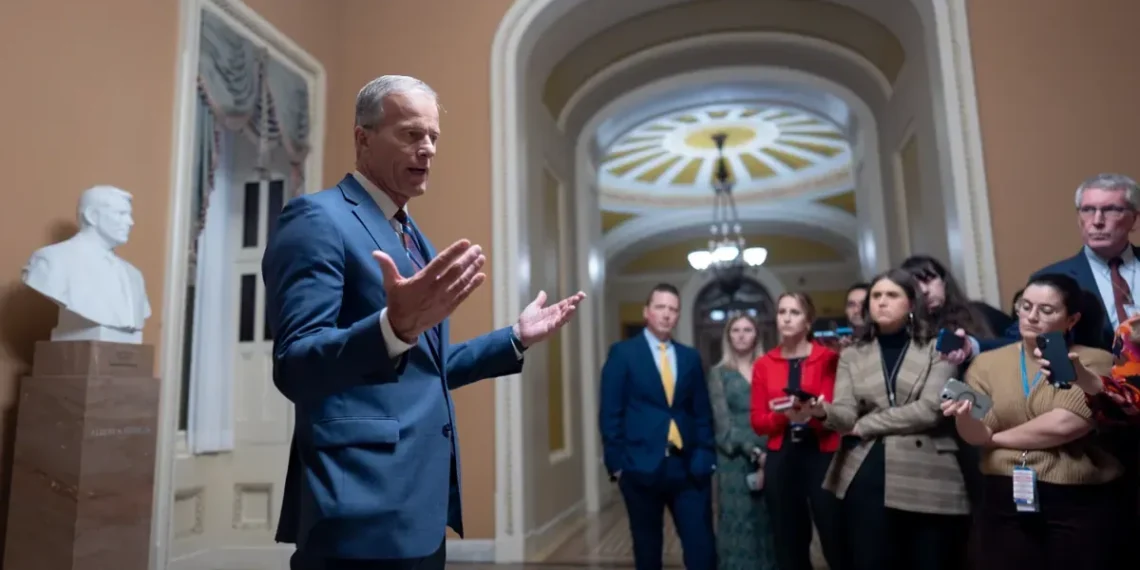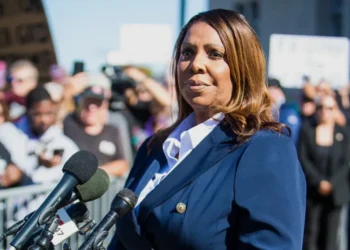The U.S. Senate voted Monday to pass a bipartisan bill aimed at reopening the federal government after a record 41-day shutdown that disrupted essential services and left hundreds of thousands of federal employees without pay. The measure now moves to the House of Representatives, which is expected to vote later this week.
A Breakthrough After Weeks of Political Deadlock
The Senate approved the legislation in a 60–40 vote, marking the end of an extended standoff between Democrats and Republicans over the future of federal health care tax credits. President Donald Trump signaled support for the bill, saying the government would be “opening up our country very quickly.”
The shutdown, which began on October 1, was the longest in U.S. history. It left food aid programs delayed, caused widespread airport disruptions, and financially strained hundreds of thousands of unpaid government workers.
House Speaker Mike Johnson urged lawmakers to return to Washington immediately, though the House vote is not expected until Wednesday. “It appears our long national nightmare is finally coming to an end,” Johnson said in a statement.
How Negotiations Finally Produced a Deal
After more than six weeks of gridlock, a coalition of moderate senators — including New Hampshire Democrats Jeanne Shaheen and Maggie Hassan and Independent Angus King of Maine — brokered an agreement to advance three bipartisan annual spending bills. The deal would fund most federal operations through late January, with a promise from Republicans to hold a separate vote on extending health care tax credits by mid-December.
“This was the option on the table,” Shaheen said Monday, explaining that prolonged negotiations had reached an impasse. She emphasized that the compromise “gives us an opportunity to continue to address health care going forward.”
The bill also reverses mass firings of federal employees initiated during the shutdown and guarantees back pay for all affected workers once government operations resume. The agreement includes protections against additional layoffs through the end of January.
Senators Tim Kaine of Virginia, Dick Durbin of Illinois, John Fetterman of Pennsylvania, and Nevada’s Catherine Cortez Masto and Jacky Rosen joined the moderates in voting to advance the measure. Senate Democratic leader Chuck Schumer and most Democrats opposed it, saying the bill fell short of addressing key health care provisions.
Dissent Within the Democratic Party
While the bipartisan deal ended the shutdown, it exposed deep divisions within the Democratic Party. Senate Majority Leader Chuck Schumer said he could not support the bill “in good faith” after consulting with his caucus for over two hours on Sunday.
“We will not give up the fight,” Schumer said, arguing that the party had “sounded the alarm” on the issue of health care affordability.
Independent Senator Bernie Sanders called the decision a “horrific mistake,” while Senator Chris Murphy of Connecticut warned that Democrats were abandoning voters who had supported their health care platform in recent elections.
In the House, Progressive Caucus Chair Greg Casar of Texas described the Senate deal as a “betrayal” of working families. “A deal that doesn’t reduce health care costs is not a victory,” he said.
However, House Democratic leader Hakeem Jeffries expressed measured support for Schumer’s leadership throughout the shutdown, saying, “The American people know we are on the right side of this fight.”
The Road Ahead: Renewed Debate Over Health Care Subsidies
The upcoming debate in Congress now centers on the future of federal health care tax credits, which were expanded during the COVID-19 pandemic and are due to expire soon. Republicans remain divided on how to handle the subsidies.
House Speaker Mike Johnson said Republicans have long been open to “reforming the unaffordable care act” but did not commit to bringing a subsidy extension to a vote.
Several GOP senators, including Appropriations Committee Chair Susan Collins, said they support extending the credits with new income limits. “We do need to act by the end of the year, and that is exactly what the majority leader has promised,” Collins said.
Democrats have indicated they may consider modest reforms but warned against cuts that would increase premiums for millions of Americans.
Meanwhile, former President Trump and several Republican lawmakers renewed calls to overhaul or repeal the Affordable Care Act altogether. The Senate narrowly voted 47–53 against a one-year extension of the subsidies on Monday, signaling the difficulty of reaching a longer-term agreement.
An End to the Shutdown, But Lingering Political Divides
Although the Senate’s passage of the bill marks a step toward restoring government operations, analysts say the standoff revealed sharp political polarization over federal spending and social programs. The measure’s success in the House remains crucial to avoid further disruption.
If passed, the legislation will reopen agencies, guarantee back pay for furloughed workers, and provide temporary stability for millions of Americans relying on federal programs. Yet, as negotiations resume in December, the issue of health care subsidies could once again test Washington’s fragile bipartisanship.














